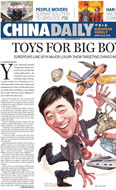On the road less traveled
Updated: 2011-04-01 10:34
By Andrew Moody (China Daily European Weekly)
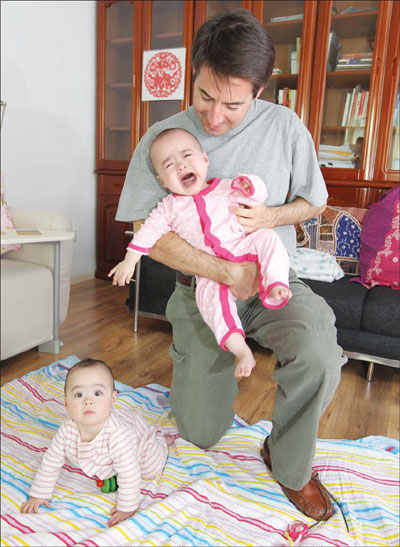 |
|
Peter Hessler and his wife Leslie Chang plan to relocate the |
Peter Hessler says his latest offering Country Driving is sociology, anthropology and journalism rolled into one
Peter Hessler, the well-known China writer, appears like someone constantly on the move. The American - in Beijing to promote his most recent book, Country Driving - was staying in a friend's apartment in the Gongti (Workers' Stadium) area of the city. Evidence of a peripatetic lifestyle is everywhere. Clothes are strewn across a bedroom floor, some of which his wife Leslie T. Chang, also a writer, is trying to cram into various bags.
We find refuge on the somewhat overly sunny balcony, necessitating both of us having to wear sunglasses.
"This is actually our first time back (to China) since the Olympics. We now live in southwestern Colorado. Leslie and I are here to do literary festivals for a month and also keep up with people," he says.
Anyone reading Country Driving, the third in a trilogy of books that began with River Town, published in 2001 and which is still seen as something of a classic about China, will be aware that Hessler does not mind roughing it.
While driving around China in a rented vehicle he sometimes stays overnight in truck stops, where he shares dormitory accommodation with truck drivers.
"Periodically, I would take a break from that. Every week or so I would try and find somewhere I could chill out for a day or so because it was really exhausting," he says.
Fans of River Town, which describes Hessler's total immersion in a new culture as a Peace Corps volunteer teaching English in Fuling, Southwest China's Sichuan province, on the Yangtze River in the mid-1990s, and also Oracle Bones, his second book, will not be disappointed by Country Driving.
Written over almost a decade, the book is divided into three parts with a connecting theme, the story of a country on the move with tens of millions of people migrating to find better-paid work.
The first section is a journey by car along the route of the Great Wall, where Hessler observes a string of villages dying because most people of working age have left to work in the bigger cities.
In the second part, Hessler lives in one such village, Sancha, north of Beijing, and assimilates into the community.
In the third, the author spends time in Zhejiang province with migrant workers making, among other things, the wires that go into bras.
"The goal was to look at the themes you see in these places and delve into them. It is very poignant to go through these places. It is a way of life that is disappearing. It has happened in many other places but here it is a faster pace than in Europe or America," he says.
Hessler, 41, studied creative writing under the tutelage of Pulitzer-prize winning writer John McPhee while at Princeton University before winning a Rhodes scholarship
to study English at Oxford University.
What brings his books alive is the quality of the writing, which Hessler admits is the result of a long gestation process of taking extensive notes, endlessly drafting and redrafting and working on a narrative.
He is an admirer of the travel writer Paul Theroux, himself a Peace Corps volunteer, Ernest Hemingway and the travel writing of VS Naipaul.
His own books have been described as "genre defying" since they don't quite fit into the travel writing oeuvre, offering perhaps something much deeper.
"I consider it (Country Driving) a travel book but it is also sociology, anthropology and journalism as well," he says.
What sets Hessler apart from many Western writers about China is that he gets up close. His two years in Fuling described in River Town set him on the road to becoming completely fluent in the language.
In Country Driving, he gives lifts in his car to people who perhaps have never seen a foreigner in their lives and wonder whether Hessler is actually Chinese given his linguistic ability.
"I think if I had to have a Chinese person as an interpreter, it would put me in a very different position. Being alone people used to ask me whether I was Chinese or a Uygur. They just couldn't understand why a foreigner would be talking to them in Chinese and driving a car," he says.
Hessler, who also writes for The New Yorker magazine, likes his books to evolve slowly and doesn't work to strict publisher's deadlines. As a result his writing itself comes across as unhurried.
"I just write a book and then send it and if they want to publish it, they can. The appeal of doing books is that you have this total freedom. The books sell well but they are not best-sellers like Eat, Pray, Love. I hope they are better," he says.
"They are not necessarily written to sell copies. It is more you want to have an impact, you want people to read it carefully and if there is depth in the book, you want them to learn something."
Hessler has yet to reach a major Chinese audience but this may change this year when River Town is finally published in Chinese. The translation has been done by one of his former teaching colleagues in Fuling.
"I am doing some press stuff for Chinese publishers now. I am not sure whether they will market well in Chinese. I am trying to figure that out. It will be interesting to see," he says.
While his books might be going into Chinese, Hessler is taking a break from China altogether.
He, Chang (author of the highly acclaimed book about female migrant workers, Factory Girls) and their 9-month-old twins are to relocate to Egypt to witness a perhaps pivotal moment in the development of that country.
He admits part of the motivation is not to be viewed just as the guy who writes about China.
"I think you learn different skills by reporting and writing about other places. We still haven't finalized everything yet but we are pretty sure that is where we are going. I will try and learn the language like I did here," he says.
"I cannot expect to recreate what I did in China necessarily but I will probably be in the Middle East for five or six years," he says.
He promises, however, Country Driving, won't be his last word on China.
"I feel young enough to write about a different place and then come back. I don't think this will be my last book on China," he says.
E-paper
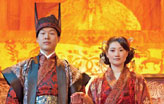
Han me downs
Traditional 3,000-year-old clothes are making a comeback.
Reaching out
Fast growth fuels rise in super rich
Chinese tourists spend more
Specials

Share your China stories!
Foreign readers are invited to share your China stories.
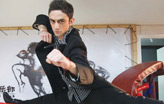
No more Mr. Bad Guy
Italian actor plans to smash ‘foreign devil’ myth and become the first white kungfu star made in China.
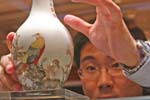
Art auctions
China accounted for 33% of global fine art sales.
